
All Tomorrow's Parties (Dir. All Tomorrow's People and Jonathan Caouette 2009, 82 mins)
In an out-of-season holiday camp on the coast of England, alternative music festival All Tomorrow's Parties serves up a heady combination of alternative music, crazy golf and chalet-living; all curated by a single band or artist. This post-punk DIY bricolage uses material generated by the fans and musicians themselves, on a multitude of formats and over the history of ATP, to capture the uncompromising spirit of a parallel music universe. - Beatink.com

Attack on the Bakery (Dir. Naoto Yamakawa, 1982, 17 mins)
Two existentially hungry labourers 'get in character' to rob a baker's shop. But the communist baker outwits them: if they'll listen to a Wagner opera, he'll give them all they can eat. They take the deal but the trade off leaves them hungry.
Attack on the Bakery is an adaptation of a short story (originally called The Second Bakery Attack) by Haruki Murakami, one of the few screen adaptations Murakami has ever sanctioned. In the original story, a young lawyer tells his new wife about a time when he attacked a bakery as a struggling student. His wife persuades him that the attack has left him cursed and that they must stage another in order to overcome the all-encompassing hunger that has beset them in the middle of the night. Naoto's stylish adaptation does not retell the original story, but instead returns to the initial bakery attack, translating Murakami's peculiar wit and ironic use of moral ambiguity seamlessly into the language of film.

Daylight Express (Dir. D. A. Pennebaker, 1953, 5 mins)
D.A. Pennebaker has been making films for over 50 years, amongst them the Bob Dylan classic DON'T LOOK BACK (1967). He is widely regarded as one of the pioneers of cinema verite, a style that revolutionized the documentary genre by using uninterrupted observation, creating a fly-on-the-wall sense of immediacy.
Set to a Duke Ellington track of the same name, his early short film, DAYBREAK EXPRESS, takes the audience from one end of a New York subway route to the other, propelling us through the mid-20th century metropolis.
"I didn't know much about film editing, or in fact about shooting, so I bought a couple of rolls of Kodachrome at the drugstore, and figured that since the record was about three minutes long, by shooting carefully I could fit the whole thing onto one roll of film. Of course that didn't work since I couldn't start and stop my hand-wound camera that easily so I ended up shooting both rolls and even a few more before I was through. It took about three days to film, and then sat in a closet for several years until I figured out how to edit it and make a print that I could show on a projector." D.A. Pennebaker

Five Feet High and Rising (Dir. Peter Sollett, 1999, 29 mins)
FIVE FEET HIGH AND RISING is an inspired look at sexual innocence and discovery set in the distinctive world of New York City's Lower East Side, where Victor, a twelve year-old boy, experiences what growing up is all about.
Peter Sollett graduated from NYU's Tisch School of the Arts in 1998. His thesis film, FIVE FEET HIGH AND RISING, won a string of awards including the Jury Prize in Short Filmmaking at the 2000 Sundance Film Festival and the award for Best Short in the Cinefondation section of the Cannes International Film Festival. The film also provided the inspiration for his feature debut, RAISING VICTOR VARGAS, which premiered at Cannes in 2002 and went on to win several international awards as well as five Independent Spirit Award nominations.

Forklift Driver Klaus (Dir. Stefan Prehn And Joerg Wagner, 2000, 10 mins)
It is a proud moment for Klaus. He has passed all his exams and is about to embark on his first day as a forklift truck driver. But the job turns out to be more difficult than he thought.
A cult hit, Forklift Driver Klaus is a hilarious melding of the industrial safety video and the splatter movie. Made by Joerg Wagner and Stefan Prehn, on a budget of [euro]50,000, the nine minute film has won numerous awards and became a favourite at festivals across the world. Often compared to Peter Jackson's Bad Taste and Brain Dead, the filmmakers added a special thought for German viewers by casting Egon Hoegen, the voice of a well known series of German road safety films.
The film has gained a huge following for its gory descent into splatter from the extremely realistic info-movie set up The unflinchingly gruesome accidents build up to a crescendo of blood, guts and decapitation that has delighted horror and comedy fans alike.
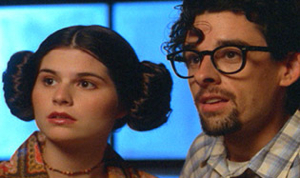
George Lucas in Love (Dir. Joe Nussbaum, 1999, 8 mins)
Three years after graduating from USC, Joe Nussbaum directed and co-wrote the short film, GEORGE LUCAS IN LOVE. This short satire of STAR WARS and SHAKESPEARE IN LOVE, shot over two days, has Lucas searching for the true origins of the Star Wars saga during the creator's college years, and introduces an assortment of characters that serve as the director's inspiration. The film was a download sensation when it was made available temporarily online. George Lucas wrote to the filmmakers to let them know how amused he was by the film.
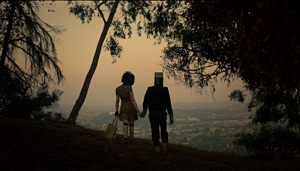
I'm Here (Dir. Spike Jonze, 2010, 29 mins)
I'm Here is a love story about two robots living in contemporary Los Angeles. The sad-eyed robot librarian Sheldon (Andrew Garfield) leads a lonely and methodical life, until he one day meets Francesca, a creative and free-spirited female robot (played by Sienna Guillory). Robot romance develops and the story is just as beautiful as it is unpredictable.
The soundtrack includes original music by Sam Spiegel and original songs by L.A.-based art musician Aska Matsumiya and other artists: Girls, Sleigh Bells, Animal Collective and Gui Boratto. http://www.contrarede.com/special/spike.html
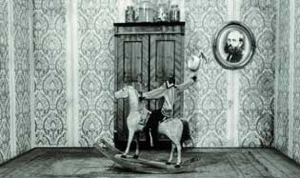
Jabberwocky (Dir. Jan Svankmajer, 1971, 13 mins)
The world is divided into two unequal camps...those who have never heard of Jan Svankmajer and those who happen upon his work and know that they have come face to facer with genius. The New Yorker
Jan Svankmajer is one of the world's most imaginative and extraordinary film-makers. Jabberwocky, based on Lewis Carroll's poem, is one of the most famous works of this master surrealist, whose body of work consists mainly of short films.
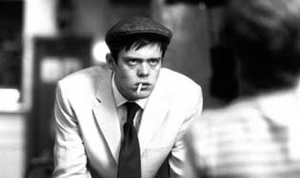
Je t'aime John Wayne, (Dir. Toby Macdonald, 2000, 10 mins)
London co-stars as Paris in JE T'AIME JOHN WAYNE, the story of a young man who lives out his dream of being French cinema icon Jean Paul Belmondo, star of Jean-Luc Godard's new wave classic A BOUT DE SOUFFLE. He's got the sharp suit and a pack of Luckies, but will he find the perfect girl to complete the picture?
This first film from director Toby MacDonald and producer Luke Morris was a hit at film festivals around the world, was BAFTA nominated and won the European Film Award for Best Short in 2001. Shot in 35mm in black and white, it stars Kris Marshall (LOVE ACTUALLY, FOUR FEATHERS) and Camilla Rutherford (GOSFORD PARK, THE DARJEELING LIMITED). Luke Morris and Toby MacDonald were recently BAFTA nominated for the second time for HEAVY METAL DRUMMER, a film about a young heavy metal fan in the Middle East.
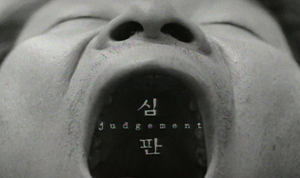
Judgement, (Dir. Park Chan-Wook, 1999, 26 mins)
One dead body, two families claiming it, an invasive local news team and a small-minded government bureaucrat. Will they get to the bottom of who deserves compensation for the young girls' death in a recent earthquake? And why is only one man left standing when an aftershock hits the morgue?
South Korea's Park Chan-wook is internationally celebrated for his vengeance trilogy, consisting of 2002's Sympathy for Mr. Vengeance, Oldboy in 2003 and Sympathy for Lady Vengeance in 2005. Judgement is Chan-wook's only short film and we can already see the influences - Kafka, Vonnegut, Hitchcock (to name but a few) - that re-surface in his later works. Chan-wook made Judgement after seeing footage of an earthquake which hit the famous Sampoong department store in South Korea. He interspersed the short with real news footage of the disaster and describes the film as representing a 'collective mood of fear'.
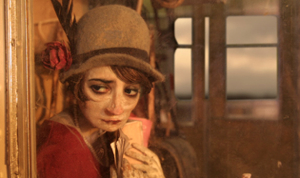
Madame Tutli-Putli (Dir. Chris Lavis & Maciek Szczerbowski, 2007, 18 mins)
Madame Tutli-Putli boards the night train with all her worldly possessions. As she drifts into sleep, strange sights start to appear, and Madame Tutli-Putli's trip takes a nightmarish turn for the worse. Chris Lavis and Maciek Szczerbowski spent the best part of a month on a train in order to prepare themselves for making Madame Tutli-Putli,. They wanted to discover 'the distinct rhythm of travel that would authenticate [her] journey and spent time studying how the changing light moved across traveller's faces.
They then spent four years making the film and, with special affects artist Jason Walker, pioneered a whole new production process:
'One of the most important creative issues [of the film] was how to bring human emotion and expressiveness to stop-motion puppets. In the end, the solution arose when Jason tested the tracking and re-timing of live action human eyes onto a stop-motion scene.' Different human actors were used for almost all of the puppets and making the film was a painstaking process that involved shooting a human actor's corresponding "eye performance" to match each puppet move. The resulting film is in equal measure as remarkable, surreal and moving. It won 36 awards and was nominated for an Oscar.
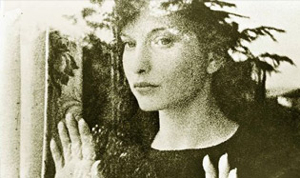
Meshes Of The Afternoon (Dir. Maya Deren, 1943, 15 mins)
Meshes Of The Afternoon is one of the most influential works in American experimental cinema. A non-narrative work, it has been identified as a key example of the trance film, in which a protagonist appears in a dreamlike state, and where the camera conveys his or her subjective focus. The central figure in Meshes of the Afternoon, played by Deren, is attuned to her unconscious mind and caught in a web of dream events that spill over into reality.
Made by Deren with her husband, cinematographer Alexander Hammid, MESHES OF THE AFTERNOON established the independent avant-garde movement in film in the United States directly inspiring early works by Kenneth Anger, Stan Brakhage, and other major experimental filmmakers.
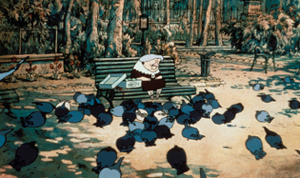
The Old Lady and the Pigeons (Dir. SYLVAIN CHOMET, 1998, 22 mins)
A starved gendarme watches mournfully as a little old lady sits feeding wonderful delicacies to pigeons in the park. He is desperate to share their fortune. But when he fashions himself a disguise and fills his belly at the expense of this little old lady, the gendarme forgets to consider that he may not be her only pet. Sylvain Chomet had the idea for The Old Lady and the Pigeons in 1987 but it took ten years, and a move across three countries before it could finally be realised. He did almost all the animation himself, by hand:
'It was the only way to do it. When you start with an idea like that there are not many people who will believe in it.'
Once finished however, the film won several awards and was nominated for an Oscar. Chomet then met French producer Didier Brunner and together they began to conceive Triplettes de Belleville (Belleville Rendezvous), which went on to receive two Oscar nominations.
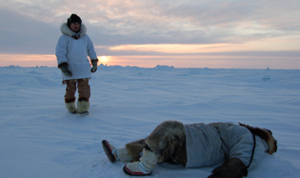
Sikumi (On The Ice) (Dir. Andrew Maclean, 2008, 15 mins)
Hunting seals on the desolate sea ice of Alaska, Apuna witnesses a fatal brawl. Knowing both killer and victim he is faced with a terrible choice: honour the dead or protect the living. Andrew Okpeaha MacLean was born and raised in Northern Alaska. Sikumi is the first ever film made entirely in his native Inupiaq language and it won him the Jury Prize at the Sundance Film Festival 2008.
Shot on anamorphic 35mm, the film was made near MacLean's home town, where the actors - none of whom had had any formal training - were also from. Aesthetically, the location was important to MacLean, as was the isolated nature of the spot. It brought to mind the work of Sergio Leoni, director of the first commercially successful spaghetti western:
'I find that westerns are really often about morality. You end up with characters, outside the boundaries of society, dealing with issues of right and wrong on a very personal basis.'
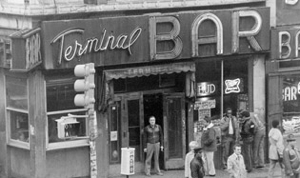
Terminal Bar (Dir. Stefan Nadelman, 2002, 22 mins)
This debut short by Stefan Nadelman, who had been working as a print and web designer, prior to making films, is a stunning portrait of a hidden corner of New York City. TERMINAL BAR is a Flash animated documentary about one of the toughest most eccentric bars in the city, as seen through the haunting black-and-white photographs taken by the directors father, Sheldon, who was a bartender at the 42nd Street bar from 1972 to 1982. Amongst its accolades the film won the Jury prize at the 2003 Sundance Film Festival.
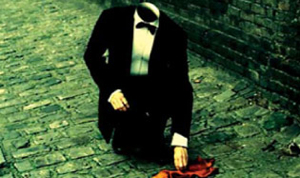
The Man Without A Head (Dir. Juan Solanas, 2003, 18 mins)
The Man Without A Head (L'homme Sans Tete) is one of the most outstanding short film debuts of recent years. Made over 4 years, by Juan Solanas, it's not only visually and technically accomplished but also sensitively drawn - and a great example of how a short can be every bit as entertaining and moving as a feature. The film won a raft of awards around the world including the Jury Prize at the 2003 Cannes Film Festival and the Cesar at France's leading awards ceremony this year.
An ordinary room overlooking a vast industrial landscape. In the distance, the ocean as far as the eye can see. With a nostalgic air, the man without a head dances with lively steps. A bow tie is tied. A photograph, with a dazzling look from the one he loves. He prepares himself for the romantic rendezvous. Tonight, he will declare his love. For such an occasion, he shall buy a head.
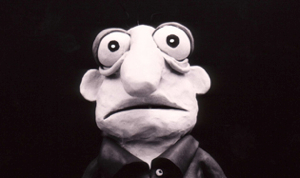
Uncle (Dir. Adam Elliott, 1996, 9 mins)
The biography of a humble man, his lemon tree, his Chihuahua and his love of crumpets. Adam Elliot describes his films as 'clay-mated biographies' and although their physical appearance has drawn comparisons to the Wallace and Gromit franchise, his films are actually a far cry from Aardman animations.
'I try to make believable characters who have a degree of emotional depth. I don't sit down and try to come up with an idea. These stories have been part of me for a long time. Uncle, Cousin and Brother are all based on people I know'.
Elliot would not even class himself as a big fan of animation, the clay models having been more of an incidental medium for his pieces:
'I am more inspired by photographers and filmmakers like Mike Leigh. My favourite film is actually Nuts in May '
Uncle is the first in his series of short film biographies and, with moving proximity, details the little habits as well as the major life events of Elliot's own Uncle. Like his two following biographical shorts and the Oscar winning piece Harvie Krumpet, Uncle navigates expertly between humour and pathos, comedy and tragedy.
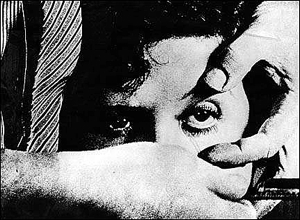
Un Chien andalou (Salvador Dali, Dir. Luis Bunuel, 1929, 17 mins)
Luis Bunuel's legendary first film, Un Chien andalou written with Salvador Dali, created a scandal at its premiere and its startling eye-slicing opening sequence has continued to shock viewers ever since. Despite Bunuel and Dali's energetic rejections of any rational meaning in the film, Un Chien andalou is an exploration of desire and the obstacles in the path of instinctual passion, equally indebted to Surrealism and Freud.